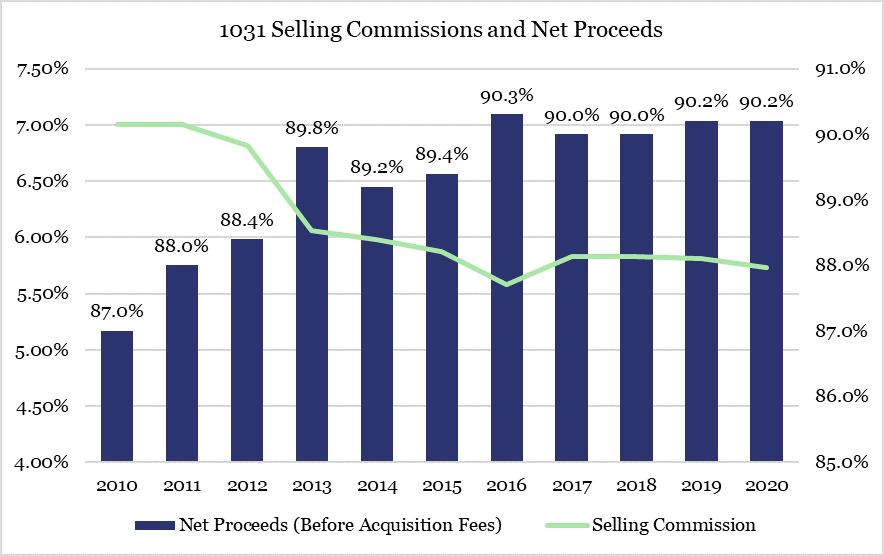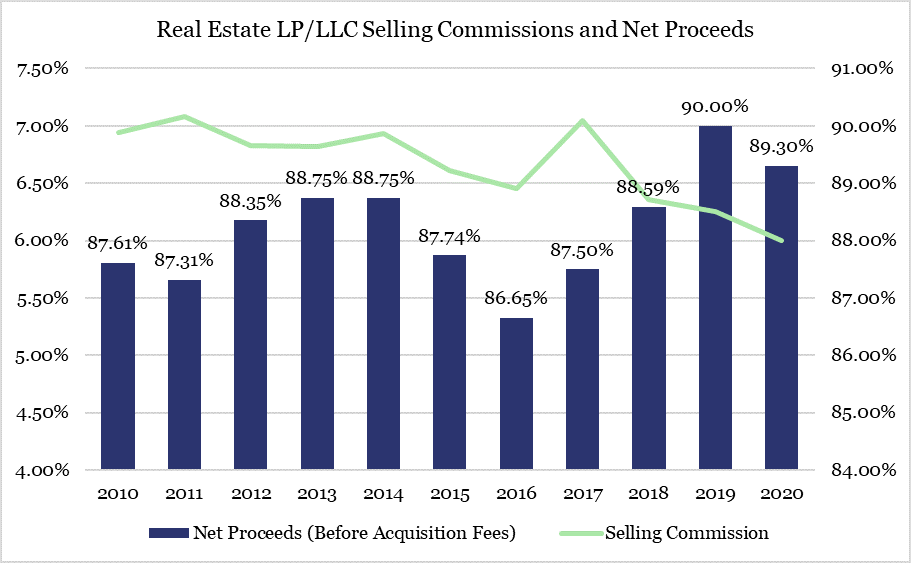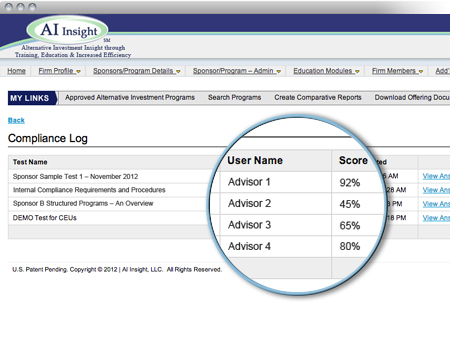Thursday, March 12th, 2020 and is filed under Industry Reporting
AI Insight currently covers 72 1031 exchange programs and 58 non-1031 real estate private placements. In our February 2020 Private Placement Industry Report, it shows that both categories are growing again in 2020, with 1031s continuing their record growth from the last couple of years.
We wanted to look at fees within both categories, from a current standpoint – what do fees look like now, and from a historical standpoint – have up-front selling commissions declined and have net proceeds increased?
Current Fees
To look at current fees, we utilized our Fee and Expense Report which compares fees on similar programs within our coverage universe. This report updates as programs close and new coverage is added. Below is a snapshot of programs raising capital as of March 9, 2020.
1031 Exchanges
- Up-front selling commission
- Industry Range: 5 – 6.55%
- Industry Average: 5.76%
- Net Proceeds (Before Acquisition Fees)
- Industry Range: 84.78 – 92.50%
- Industry Average: 90.11%
- Acquisition Fees and Expenses
- Industry Range: 0.16 – 13.25%
- Industry Average: 4.29%
- Liquidation Fees
- Industry Range: 1 – 8.50%
- Industry Average: 3.08%
Non-1031 Real Estate LPs and LLCs:
- Up-front selling commission
- Industry Range: 0 – 8%
- Industry Average: 5.49%
- Net Proceeds (Before Acquisition Fees)
- Industry Range: 86.50 – 98%
- Industry Average: 90.32%
- Acquisition Fees and Expenses
- Industry Range: 0 – 19%
- Industry Average: 2.74%
- Liquidation Fees
- Industry Range: 0 – 40%
- Industry Average: 7.98%
Historical Fees – Up-front Selling Commissions
Fees have always been a focus of regulatory concern, although up-front selling commissions have been at the forefront of regulatory scrutiny over the last decade. FINRA Regulatory Notice 15-02 required greater transparency into pricing including fees for direct participation programs and non-traded REITs. The DOL’s previously proposed Fiduciary Rule and now Regulation Best Interest, require financial professionals to carefully review and disclose the material fees and costs related to a client’s holdings.
With this in mind, we reviewed the data on our platform for the real estate private placements we covered over the last decade to see if there has been any change in the average up-front selling commissions and the average net proceeds (before acquisition fees, which includes up-front fees and expenses taken from offering proceeds) for these programs.
We found that up-front selling commissions have declined and net proceeds before acquisition fees has increased for 1031 exchanges and non-1031 real estate private placements over the last decade.
1031 selling commissions went from an average of 7% in 2010 to 5.73% for programs that opened in 2020, while the average net proceeds increased from 87 to 90.2%. This is a difference of approximately $3,200 on a $100,000 investment.

Results are similar for non-1031 real estate LPs and LLCs, with selling commissions declining from an average of 6.94% in 2010 to 6% in 2020. Net proceeds are up from 87.61% in 2010 to 89.30% in 2020 for a difference of $2,390 per $100,000 investment.

When looking at fees over time for real estate private placements, it appears the industry has responded to regulatory focus over the last decade by reducing up-front fees and expenses; even for private placements that may not be applicable to FINRA Regulatory Notice 15-02. However, real estate by its very nature can be an expensive asset class.
It is important to remember that although it may be good to see up-front fees decline, there are many other fees and expenses related to owning and operating direct real estate that must be considered reasonable including, but not limited to, construction costs, acquisition-related expenses, financing costs, leasing commissions, insurance and legal costs, and property management fees.
Wednesday, February 12th, 2020 and is filed under AI Insight News
FINRA recently issued its 2020 Risk Monitoring and Examination Priorities Letter along with its 2019 Report on Examination Findings and Observations. As expected, Regulation Best Interest (Reg BI) takes the lead in this discussion. These reports also highlight, among other things, the continued focus on sales practices regarding supervision and client suitability.
Specifically, the 2020 Priorities Letter states,
“In the first part of the year, FINRA will review firms’ preparedness for Reg BI to gain an understanding of implementation challenges they face and, after the compliance date, will examine firms’ compliance with Reg BI, Form CRS and related SEC guidance and interpretations. FINRA staff expects to work with SEC staff to ensure consistency in examining broker-dealers and their associated persons for compliance with Reg BI and Form CRS.”
The 2019 Findings Report stated,
“Some firms did not have adequate systems of supervision to review that recommendations were suitable in light of a customer’s individual financial situation and needs, investment experience, risk tolerance, time horizon, investment objectives, liquidity needs and other investment profile factors. This report shares some new suitability-related findings, as well as additional nuances on prior years’ findings.”
Cybersecurity
At the end of the letter, FINRA addresses firm operations, technology and cybersecurity noting, “FINRA recognizes that there is no one-size-fits-all approach to cybersecurity, but expects firms to implement controls appropriate to their business model and scale of operations.”
Key Takeaways
- See this checklist, which explains key differences between FINRA rules and Reg BI and Form CRS.
- Carefully review and understand the specific suitability requirements for each non-traded or private placement program utilized and ensure that your firm has a documented process in place to monitor the compliance with suitability requirements.
- Document the due diligence process – remember, if it isn’t documented, it was never done.
- Review how regulators look at cybersecurity and key strategies to be compliant. Click here for additional resources and take the CE Course, “Cybersecurity Awareness for Financial Professionals”.
Let AI Insight help you stay compliant
- Discover how you can create efficiencies in your due diligence review process using our database of 350+ alternative investments to source new products as well as analyze and compare hundreds of alternative investment programs, including non-traded programs, private placements, and alternative mutual funds.
- Demonstrate your due diligence by conducing product-specific training on the features, risks and suitability for hundreds of offerings.
- Document what you’re doing to support your firm’s regulatory requirements in a transparent way. AI Insight captures all of the activity you and your firm members complete within the platform including training modules, offering document reviews and research conducted.
Resources
Wednesday, May 28th, 2014 and is filed under AI Insight News
 Broker Dealers are finding the Regulatory focus and the need to provide documentation increasingly demanding – particularly when it comes to offering complex products to their clients. As new regulations are released, a trend toward a fiduciary standard for broker dealers and their advisors appears to be emerging. Read More
Broker Dealers are finding the Regulatory focus and the need to provide documentation increasingly demanding – particularly when it comes to offering complex products to their clients. As new regulations are released, a trend toward a fiduciary standard for broker dealers and their advisors appears to be emerging. Read More
Tuesday, June 11th, 2013 and is filed under AI Insight News
FINRA recently issued Regulatory Notice 13-18: Communications With the Public to provide guidance to firms on communications with the public concerning unlisted real estate investment programs, including unlisted real estate investment trusts (REITs) and unlisted direct participation programs (DPPs) that invest in real estate. This notice can be read in its entirety here. Read More
Saturday, December 15th, 2012 and is filed under AI Insight News
December 15, 2012 – FINRA Regulatory Notice 12-55: Guidance on FINRA’s Suitability Rule. In November 2010, the Securities and Exchange Commission approved FINRA Rule 2111 (Suitability), which became effective on July 9, 2012. In May 2012, FINRA issued Regulatory Notice 12-25, which provides guidance on the rule in a frequently asked questions format. This Noticeaddresses two issues discussed in Regulatory Notice 12-25: the scope of the terms “customer” and “investment strategy.” In addition, FINRA has created a suitability web page that, among other things, will locate in one place questions and answers regarding FINRA Rule 2111. The suitability website can be found here and Notice 12-55 can be read in its entirety here.
Read More



